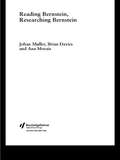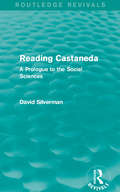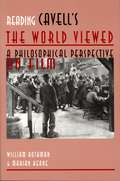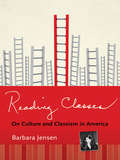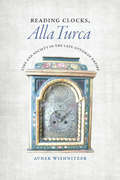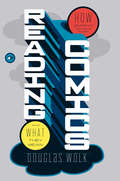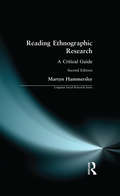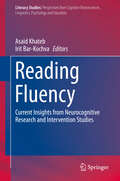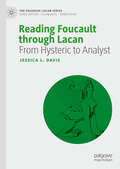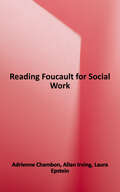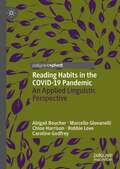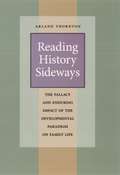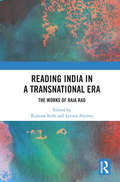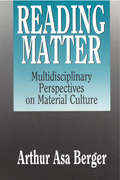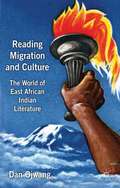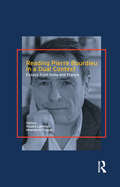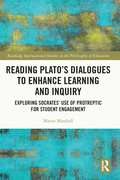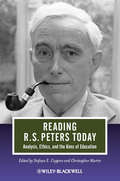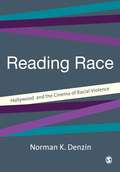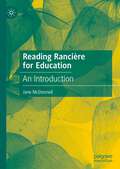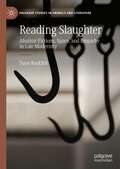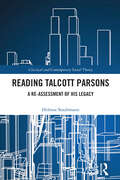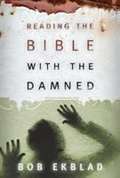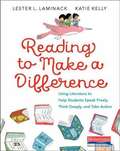- Table View
- List View
Reading Bernstein, Researching Bernstein
by Brian Davies Johan Muller Ana MoraisBasil Bernstein is arguably one of the most important educational theorists of the late 20th century. Whilst most academics and students in sociology of education know of Bernstein, few can claim to fully understand the scope and power of his work, which simply cannot be matched by any of his contemporaries.This book, written by a team of international contributors, offers an insight into the richness and depth of his theories. It demonstrates the growing recognition of the value of Bernstein's work to understanding unfolding developments in education systems around the world today.The volume is divided into four sections:* Section 1 considers the work of the theorists that Bernstein worked 'through' and 'with', from Durkheim and Marx to Bourdieu and Foucault* Section 2 focuses on teaching and learning in school contexts and draw on current issues like boy's underachievement, citizenship, system reform and language learning in varied cultural contexts* Section 3 applies Bernstein's theories to teacher education* Section 4 focuses on international and higher educationThis comprehensive text will show the international academic community in education and sociology - as well as students on education, sociology, sociolinguistic and social pyschology degrees - how to read and use Bernstein.
Reading Castaneda: A Prologue to the Social Sciences (Routledge Revivals)
by David SilvermanCarlos Castaneda’s accounts of his meeting with the Yaqui Indian magician Don Juan are well known to sociologists both in Britain and in America. Using material largely from Castaneda’s The Teachings of Don Juan, David Silverman here seeks to introduce the student of Sociology to some of the central epistemological concerns of social science. First published in 1975, the title assumes no previous knowledge of Castaneda but instead uses his work as a springboard to wider issues, in particular making sense of our reality and understanding each other by using language and communication. This is an interesting reissue, which will be of particular value to students of the sociology of language and communication, as well as Communication Studies more generally.
Reading Cavell's The World Viewed: A Philosophical Perspective on Film
by Marian Keane William RothmanIn their thoughtful study of one of Stanley Cavell's greatest yet most neglected books, William Rothman and Marian Keane address this eminent philosopher's many readers, from a variety of disciplines, who have neither understood why he has given film so much attention, nor grasped the place of The World Viewed within the totality of his writings about film. Rothman and Keane also reintroduce The World Viewed to the field of film studies. When the new field entered universities in the late 1960s, it predicated its legitimacy on the conviction that the medium's artistic achievements called for serious criticism and on the corollary conviction that no existing field was capable of the criticism filmed called for. The study of film needed to found itself, intellectually, upon a philosophical investigation of the conditions of the medium and art of film. Such was the challenge The World Viewed took upon itself. However, film studies opted to embrace theory as a higher authority than our experiences of movies, divorcing itself from the philosophical perspective of self-reflection apart from which, The World Viewed teaches, we cannot know what movies mean, or what they are. Rotham and Keane now argue that the poststructuralist theories that dominated film studies for a quarter of a century no longer compel conviction, Cavell's brilliant and beautiful book can provide a sense of liberation to a field that has forsaken its original calling. read in a way that acknowledges its philosophical achievement, The World Viewed can show the field a way to move forward by rediscovering its passion for the art of film. Reading Cavell's The World Viewed will prove invaluable to scholars and students of film and philosophy, and to those in other fields, such as literary studies and American studies, who have found Cavell's work provocative and fruitful.
Reading Classes
by Barbara JensenDiscussions of class make many Americans uncomfortable. This accessible book makes class visible in everyday life. Solely identifying political and economic inequalities between classes offers an incomplete picture of class dynamics in America, and may not connect with people's lived experiences. In Reading Classes, Barbara Jensen explores the anguish caused by class in our society, identifying classism-or anti–working class prejudice-as a central factor in the reproduction of inequality in America. Giving voice to the experiences and inner lives of working-class people, Jensen-a community and counseling psychologist-provides an in-depth, psychologically informed examination of how class in America is created and re-created through culture, with an emphasis on how working- and middle-class cultures differ and conflict. This book is unique in its claim that working class cultures have positive qualities that serve to keep members within them; that can haunt those who leave them behind. Through both autobiographical reflections on her dual citizenship in the working class and middle class and the life stories of students, clients, and relatives, Jensen brings into focus the clash between the realities of working-class life and middle-class expectations for working-class people. Focusing on education, she finds that at every point in their personal development and educational history, working-class children are misunderstood, ignored, or disrespected by middle-class teachers and administrators. Education, while often hailed as a way to "cross classes," brings with it its own set of conflicts and internal struggles. These problems can lead to a divided self, resulting in alienation and suffering for the upwardly mobile student. Jensen suggests how to increase awareness of the value of working-class cultures to a truly inclusive American society at personal, professional, and societal levels.
Reading Clocks, Alla Turca: Time and Society in the Late Ottoman Empire
by Avner WishnitzerUp until the end of the eighteenth century, the way Ottomans used their clocks conformed to the inner logic of their own temporal culture. However, this began to change rather dramatically during the nineteenth century, as the Ottoman Empire was increasingly assimilated into the European-dominated global economy and the project of modern state building began to gather momentum. In Reading Clocks, Alla Turca, Avner Wishnitzer unravels the complexity of Ottoman temporal culture and for the first time tells the story of its transformation. He explains that in their attempt to attain better surveillance capabilities and higher levels of regularity and efficiency, various organs of the reforming Ottoman state developed elaborate temporal constructs in which clocks played an increasingly important role. As the reform movement spread beyond the government apparatus, emerging groups of officers, bureaucrats, and urban professionals incorporated novel time-related ideas, values, and behaviors into their self-consciously "modern" outlook and lifestyle. Acculturated in the highly regimented environment of schools and barracks, they came to identify efficiency and temporal regularity with progress and the former temporal patterns with the old political order. Drawing on a wealth of archival and literary sources, Wishnitzer's original and highly important work presents the shifting culture of time as an arena in which Ottoman social groups competed for legitimacy and a medium through which the very concept of modernity was defined. Reading Clocks, Alla Turca breaks new ground in the study of the Middle East and presents us with a new understanding of the relationship between time and modernity.
Reading Comics
by Douglas WolkSuddenly, comics are everywhere: a newly matured art form, filling bookshelves with brilliant, innovative work and shaping the ideas and images of the rest of contemporary culture. InReading Comics, critic Douglas Wolk shows us why this is and how it came to be. Wolk illuminates the most dazzling creators of modern comics-from Alan Moore to Alison Bechdel to Dave Sim to Chris Ware-and introduces a critical theory that explains where each fits into the pantheon of art. Reading Comicsis accessible to the hardcore fan and the curious newcomer; it is the first book for people who want to know not just what comics are worth reading, but also the ways to think and talk and argue about them.
Reading Comics
by Douglas WolkSuddenly, comics are everywhere: a newly matured art form, filling bookshelves with brilliant, innovative work and shaping the ideas and images of the rest of contemporary culture. In Reading Comics, critic Douglas Wolk shows us why this is and how it came to be. Wolk illuminates the most dazzling creators of modern comics-from Alan Moore to Alison Bechdel to Dave Sim to Chris Ware-and introduces a critical theory that explains where each fits into the pantheon of art. Reading Comics is accessible to the hardcore fan and the curious newcomer; it is the first book for people who want to know not just what comics are worth reading, but also the ways to think and talk and argue about them.
Reading Ethnographic Research: A Critical Guide (Longman Social Research Series)
by Martyn HammersleyProvides a practical guide to the critical reading of ethnographic studies: discussing in detail how to identify the main arguments and what is involved in making an assessment of such studies.
Reading Fluency
by Asaid Khateb Irit Bar-KochvaThe book is dedicated to the blessed memory of Prof. Zvia Breznitz, whose groundbreaking research has made a tremendous impact on the understanding of fluency in reading. The book presents a multidimensional perspective of recent research and reviews on fluency in reading. The first part presents recent brain-imaging findings from studies into the neurobiological basis of reading, as well as cognitive and language studies exploring the underlying factors of fluency in reading and its development. The second part comprises reviews of intervention studies that address reading ability, and in particular, fluency in reading. The book provides a unique multilingual perspective on reading research by including studies of readers of different orthographies and speakers of different languages. Both scientists exploring the different aspects of reading and language, and clinicians of reading intervention will find this book not only of great interest but extremely useful in its clear and in-depth presentation of current reading research.
Reading Foucault Through Lacan: From Hysteric to Analyst (The Palgrave Lacan Series)
by Jessica L. DavisJacques Lacan and Michel Foucault are often cast as intellectual adversaries, their legacies marked by differences in method, lineages, and analytical priorities. Yet beneath their distinct projects lies a shared ambition: to decenter the Western conception of the subject while critically engaging with the notion of subjectivity in post-Kantian thought. This book examines Foucault’s critical project through the lens of Lacan’s theory of the four discourses, introduced in Seminar XVII: The Other Side of Psychoanalysis (1969-70). Divided into two parts, Reading Foucault through Lacan unfolds as a dialogue between the discourses of the Hysteric and the Analyst. Part I, “The Hysteric,” reframes Foucault’s genealogical critique from the early to mid-1970s as a form of hysterical questioning directed at Kant’s transcendental legacy and its aftermath. Through an exploration of how violence and embodied resistance interact in a discursive framework, Part I uncovers the epistemological fractures that mark the modern subject. Part II, “The Analyst,” examines Foucault’s redefinition of Kantian critique as a historically situated engagement with the present. Building on Lacan’s claim that analytic experience begins with the hystericization of discourse, this section views Foucault’s re-alignment with Kant as retroactively constituting the transformation from Hysteric to Analyst. Addressing themes such as parrhesia, transference, and the ethics of speaking, Part II examines discourse as a social link that transcends fixed identities to inhabit new modes of being. Drawing on newly available English translations of Foucault’s lectures and Lacan’s seminars, this book bridges two key trajectories in French thought and offers valuable insights for scholars of psychoanalysis, critical theory, and social philosophy.
Reading Foucault for Social Work
by Adrienne Chambon Allan Irving Laura EpsteinThis is the first book-length introduction to the work of Michel Foucault in social work. The social work profession is being challenged today to adapt to changing societal and cultural conditions and to carve out a new societal niche. Foucault's work offers a particularly relevant entry point for revisiting social work's mission, activities, and objectives. A critical reexamination of its practices, institutional arrangements, and knowledge helps us to envision alternative social work practices and strategies for social change. Each chapter emphasizes different notions from Foucault's writings. Contributions include conceptual, philosophical, and methodological considerations, and discussions from various fields and levels of practice. The book covers policy in child welfare and child protection; gay-lesbian youth services; grief work and the family; client-worker interaction in a welfare office; and the social movement of the elderly. It includes a roundtable discussion with Foucault on social work and a glossary.
Reading Habits in the COVID-19 Pandemic: An Applied Linguistic Perspective
by Marcello Giovanelli Robbie Love Chloe Harrison Abigail Boucher Caroline GodfreyThis book presents and analyses the results of the Lockdown Library Project survey, using a range of quantitative and qualitative approaches to provide a unique insight into the ways in which the first UK COVID-19 lockdown affected public reading habits. The authors begin by outlining the background to the study, the research methodology and design, and an overview of the headlines of the data, before going on to survey the literature on the relationship between pandemics, literature (especially the role played by genre and popular fiction) and reading habits. They then examine how participants reported that the lockdown period had affected the amount that they read; how they accessed books and discussed their reading with others; the use of reading as a coping strategy; and returning to re-read books that offered familiarity, reliability, and nostalgia. Finally, the concluding chapter brings together the overall findings of the project and briefly outlines future work in the field. This book will be of interest to academics in fields such as literary and genre studies, applied linguistics, corpus linguistics, stylistics, health humanities, and sociology, as well as practitioners working in education, in bibliotherapy, and in libraries.
Reading History Sideways: The Fallacy and Enduring Impact of the Developmental Paradigm on Family Life
by Arland ThorntonEuropean and American scholars from the eighteenth through the mid-twentieth centuries thought that all societies passed through the same developmental stages, from primitive to advanced. Implicit in this developmental paradigm—one that has affected generations of thought on societal development—was the assumption that one could "read history sideways. " That is, one could see what the earlier stages of a modern Western society looked like by examining contemporaneous so-called primitive societies in other parts of the world. In Reading History Sideways, leading family scholar Arland Thornton demonstrates how this approach, though long since discredited, has permeated Western ideas and values about the family. Further, its domination of social science for centuries caused the misinterpretation of Western trends in family structure, marriage, fertility, and parent-child relations. Revisiting the "developmental fallacy," Thornton here traces its central role in changes in the Western world, from marriage to gender roles to adolescent sexuality. Through public policies, aid programs, and colonialism, it continues to reshape families in non-Western societies as well.
Reading India in a Transnational Era: The Works of Raja Rao
by Rumina Sethi; Letizia AlternoThis anthology demonstrates the significance of Raja Rao’s writing in the broader spectrum of anti-colonial, postcolonial and diasporic writing in the 20th Century. In addition to highlighting Rao’s significant presence in Indian writing, the volume presents a range of previously unpublished material which contextualises Rao’s work within 20th-century modernist, postmodernist and postcolonial trends. Exploring both his fictional and non-fictional works, Reading India in a Transnational Era engages with issues of subaltern agency and national belonging, authenticity, subjectivity, internationalism, multicultural politics, postcolonialism and literary and cultural representation through language and translation. A literary volume that discusses gender and identity on both socio-political grounds, apart from dealing with Rao’s linguistic experimentations in a transnational era, this book will be of interest among scholars and researchers of English, postcolonial and world literature, cultural theory and Asian studies.
Reading Matter: Multidisciplinary Perspectives on Material Culture
by Arthur Asa BergerTo be civilized involves, among other things, making, using, and buying objects. Although speculation on the significance of objects often tends to be casual, there are professionals--anthropologists, historians, semioticians, Marxists, sociologists, and psychologists--who analyze material culture in a systematic way and attempt to elicit from it reliable information about people, societies, and cultures. One reason that analyzing objects has been problematical for scholars is the lack of a sound methodology governing multidisciplinary research. Reading Matter addresses this problem by defining a comprehensive set of methodological approaches that can be used to analyze and interpret material culture and relate it to personality and society.Berger offers discussions of the main concepts found in semiotic, historical, anthropological, psychoanalytic, Marxist, and sociological analysis. He provides practical descriptions of the working methods of each discipline and demarcates their special areas of investigation. Berger's lively discussions include a wealth of illustrative examples that help to clarify the complex and often difficult theories that underlie interpretations of material culture. In the second part of his analysis, Berger uses these disciplines to investigate one subject--fashion and an important aspect of fashion, blue jeans, and what the author calls the denimization phenomenon. Here he shows how different methods of reading material culture end up with different perspectives on things--even when they are dealing with the same topic.The author's focus is on the material culture of post-literate societies and cultures, both contemporary and historical. This comparative approach enables the reader to trace the evolution of objects from past to present or to see how American artifacts spread to different cultures, acquiring a wholly new meaning in the process. Reading Matter is an important contribution to the study of popula
Reading Migration and Culture
by Dan OjwangThis book uses the uniquely positioned culture of East African Asians to reflect upon the most vexing issues in postcolonial literary studies today. By examining the local histories and discourses that underpin East African Asian literature, it opens up and reflects upon issues of alienation, modernity, migration, diaspora, memory and nationalism.
Reading Pierre Bourdieu in a Dual Context: Essays from India and France
by Roland Lardinois1. The Crises of Imperial Societies Christophe Charle 2. Thinking the State with Bourdieu and Foucault U. Kalpagam 3. Bourdieu’s Theory of the Symbolic: Traditions and Innovations Sheena Jain 4. The Field of Indian Knowledge in France in the 1930s Roland Lardinois 5. Literature and Politics During the German Occupation Gisele Sapiro 6. Symbolic Violence and Masculine dominance in the Vichy Regime Francine Muel-Dreyfus 7. Habitus, Performance and Women’s Experience in Everyday Life Meenakshi Thapan 8. Pierre Bourdieu and Anthropology Alban Bensa 9. Documents and Testimony: Violence in the Bombay Riots Deepak Mehta Index
Reading Plato's Dialogues to Enhance Learning and Inquiry: Exploring Socrates' Use of Protreptic for Student Engagement (Routledge International Studies in the Philosophy of Education)
by Mason MarshallThis scholarly volume proposes protreptic as a radically new way of reading Plato’s dialogues leading to enhanced student engagement in learning and inquiry. Through analysis of Platonic dialogues including Crito, Euthyphro, Meno, and Republic, the text highlights Socrates’ ways of fostering and encouraging self-examination and conscionable reflection. By focusing his work on Socrates’ use of protreptic, Marshall proposes a practical approach to reading Plato, illustrating how his writings can be used to enhance intrinsic motivation amongst students, and help them develop the thinking skills required for democratic and civic engagement. This engaging volume will be of interest to doctoral students, researchers, and scholars concerned with Plato’s dialogues, the philosophy of education, and ancient philosophy more broadly, as well as post-graduate students interested in moral and values education research.
Reading R. S. Peters Today: Analysis, Ethics, and the Aims of Education (Journal of Philosophy of Education #21)
by Christopher Martin Stefaan E. CuypersReading R. S. Peters Today: Analysis, Ethics and the Aims of Education reassesses British philosopher Richard Stanley Peters’ educational writings by examining them against the most recent developments in philosophy and practice. Critically reassesses R. S. Peters, a philosopher who had a profound influence on a generation of educationalists Brings clarity to a number of key educational questions Exposes mainstream, orthodox arguments to sympathetic critical scrutiny
Reading Race: Hollywood and the Cinema of Racial Violence (Published in association with Theory, Culture & Society)
by Norman K. DenzinIn this insightful book, one of America's leading commentators on culture and society turns his gaze upon cinematic race relations, examining the relationship between film, race and culture. Norman K Denzin argues that the cinema, like society, treats all persons as equal but struggles to define and implement diversity, pluralism and multiculturalism. He goes on to argue that the cinema needs to honour racial and ethnic differences, in defining race in terms of both an opposition to, and acceptance of, the media's interpretations and representations of the American racial order. Acute, richly illustrated and timely, the book deepens our understanding of the politics of race and the symbolic complexity of segregation and discrimination.
Reading Rancière for Education: An Introduction
by Jane McDonnellThis book introduces readers to the writing of the French philosopher, Jacques Rancière, and discusses the uptake of his work in education. Written from a personal perspective, the book tells the story of the author’s engagement with Rancière’s writing as an educational researcher. The first part of the book introduces Rancière’s interventions on democracy and politics, art and aesthetics, emancipation, and education. The second part of the book analyses how Rancière’s writing has been taken up in considerations of emancipatory, democratic, and political education, art(s) education, and innovative work in educational research. The final part of the book appraises the significance of Rancière’s writing for education and considers the difficult task of applying his insights to educational scholarship.
Reading Slaughter: Abattoir Fictions, Space, and Empathy in Late Modernity (Palgrave Studies in Animals and Literature)
by Sune BorkfeltReading Slaughter: Abattoir Fictions, Space, and Empathy in Late Modernity examines literary depictions of slaughterhouses from the development of the industrial abattoir in the late nineteenth century to today. The book focuses on how increasing and ongoing isolation and concealment of slaughter from the surrounding society affects readings and depictions of slaughter and abattoirs in literature, and on the degree to which depictions of animals being slaughtered creates an avenue for empathic reactions in the reader or the opportunity for reflections on human-animal relations. Through chapters on abattoir fictions in relation to narrative empathy, anthropomorphism, urban spaces, rural spaces, human identities and horror fiction, Sune Borkfelt contributes to debates in literary animal studies, human-animal studies and beyond.
Reading Talcott Parsons: A Re-Assessment of His Legacy (Classical and Contemporary Social Theory)
by Helmut StaubmannAddressing the neglect of the work of Talcott Parsons, the complexity of whose thought and the opacity of whose writing style can prove daunting, this book provides a comprehensible account of the major theoretical accomplishments in his work and the reasons for which his legacy remains important to contemporary sociological debates. With attention to the unification of theoretical concepts for the humanities, basic methodological issues such as empiricism and functional analysis, the definition and status of culture, the interaction between the individual and society and the question of modernity and societal change, Reading Talcott Parsons: A Re-Assessment of His Legacy offers an orientation in the work of one of the 20th century’s most important sociologists and explores the reason for which his contributions to the discipline are of enduring importance. As such it will appeal to scholars and students across the social sciences with interests in social theory, social research methodology and the history of sociology.
Reading The Bible With The Damned
by Bob EkbladExploring the challenges that both the churched and the unchurched have faced regarding giving and receiving the word of God, Bob Ekblad encourages us all to learn to read the Bible together as a whole. In this compelling book, he reflects on how Christians have often found it difficult to proclaim God's good news to every realm of society, while those who have needed it most have frequently deemed themselves unworthy due to social circumstances or sinfulness. In Reading the Bible with the Damned, Ekblad offers concrete advice on how to bridge this gap through a variety of insights ultimately leading to spiritual transformation. This book is full of examples of how Scripture changes lives for those who attend Bible studies and for those who lead them, offering practical suggestions on many passages from the Old and New Testaments.
Reading To Make A Difference: Using Literature To Help Students Speak Freely, Think Deeply, And Take Action
by Lester L. Laminack Katie Kelly"This book is a gift to teachers who want to know how best to incorporate diverse literature into their classrooms. It translates rhetoric about diverse books into practical actions. Teachers will find it a valuable resource, full of examples of actual classroom practices and questions for reflecting, as well as suggestions of good books to share with students. It takes the study of diverse texts well beyond the "food, festivals and folklore" focus of the early days of attention to multicultural literature to a consideration of literature as a catalyst for social action. The thematic emphases for the chapters are broad enough to apply to texts that represent diverse cultures, but specific enough to work in diverse classrooms, from elementary school to the college level." - Rudine Sims Bishop, Professor Emerita of Education at The Ohio State University "In far too many schools, our effort to be more inclusive begins and ends with book selection. In Reading to Make a Difference, Lester and Katie teach us that this is not enough. This book is an urgent reminder that even the most powerfully diverse bookshelf cannot mask the damage done to children by practices and curriculum that fails to see them. Reading to Make a Difference shows us how to combine powerful books with purposeful, equitable practice." - Cornelius Minor Books as bridges enable readers to speak freely, think deeply, and take action. In Reading to Make a Difference, Lester and Katie build on the work of Rudine Sims Bishop, extending the notion of books as windows, mirrors, and doors. They offer a pathway that can lead students to take action for social justice causes. They show you how to move beyond exposing your students to diverse children's literature by offering an instructional framework that is applicable to any topic and can be adapted to your own classroom or community. Lester and Katie will show you how to: select and share text sets in a variety of reading experiences including read-aloud, small group, book clubs, and independent reading creating a scaffold for students to share their connections with a character, situation, issue, or topic invite students to pause and reflect provide opportunities for students to take action individually or collectively in a way that can make a difference. Each chapter highlights different classrooms in action and concludes with a wealth of suggested resources, both picture books and chapter books, along with helpful guidelines on how to choose text sets that reflect the needs, interests, and backgrounds of your students. The right book at the right time can open doors of possibility for a better world. Armed with an understanding of who your students are, where they come from, and what matters to them, you can cultivate children as thoughtful, caring citizens, and empower them to become lifelong agents of change.
